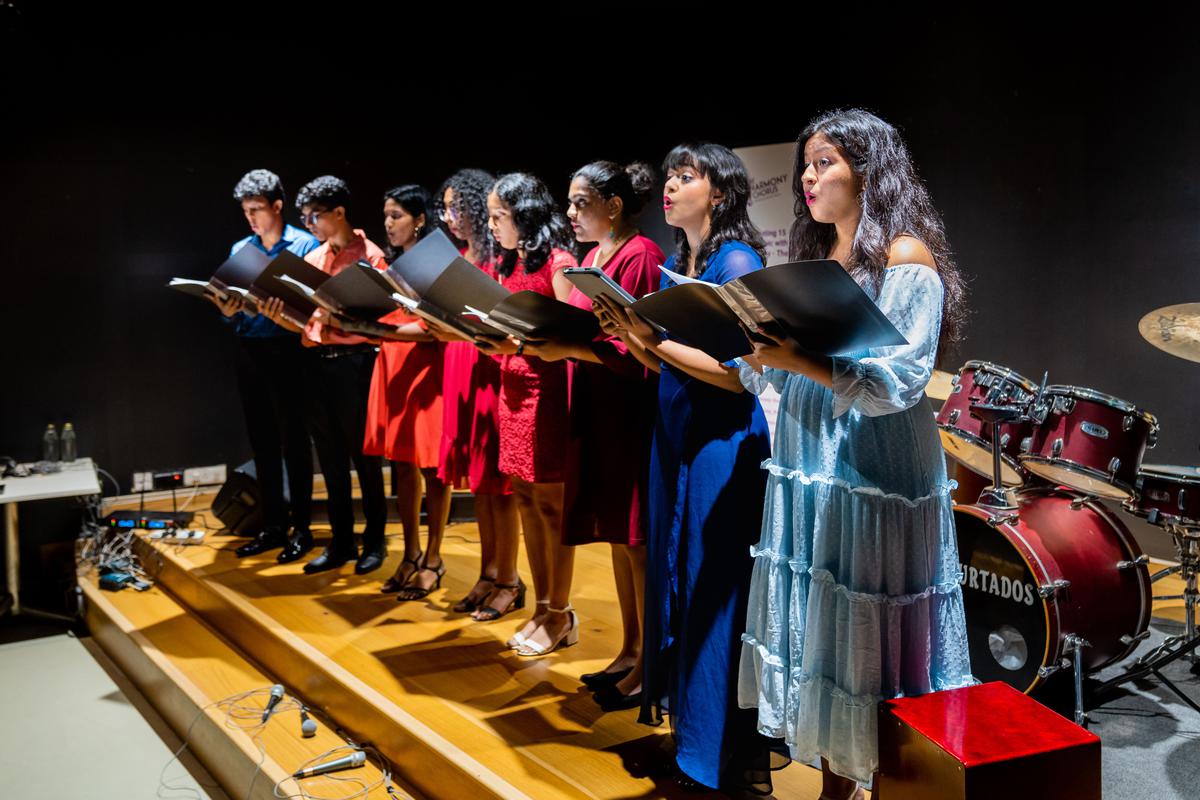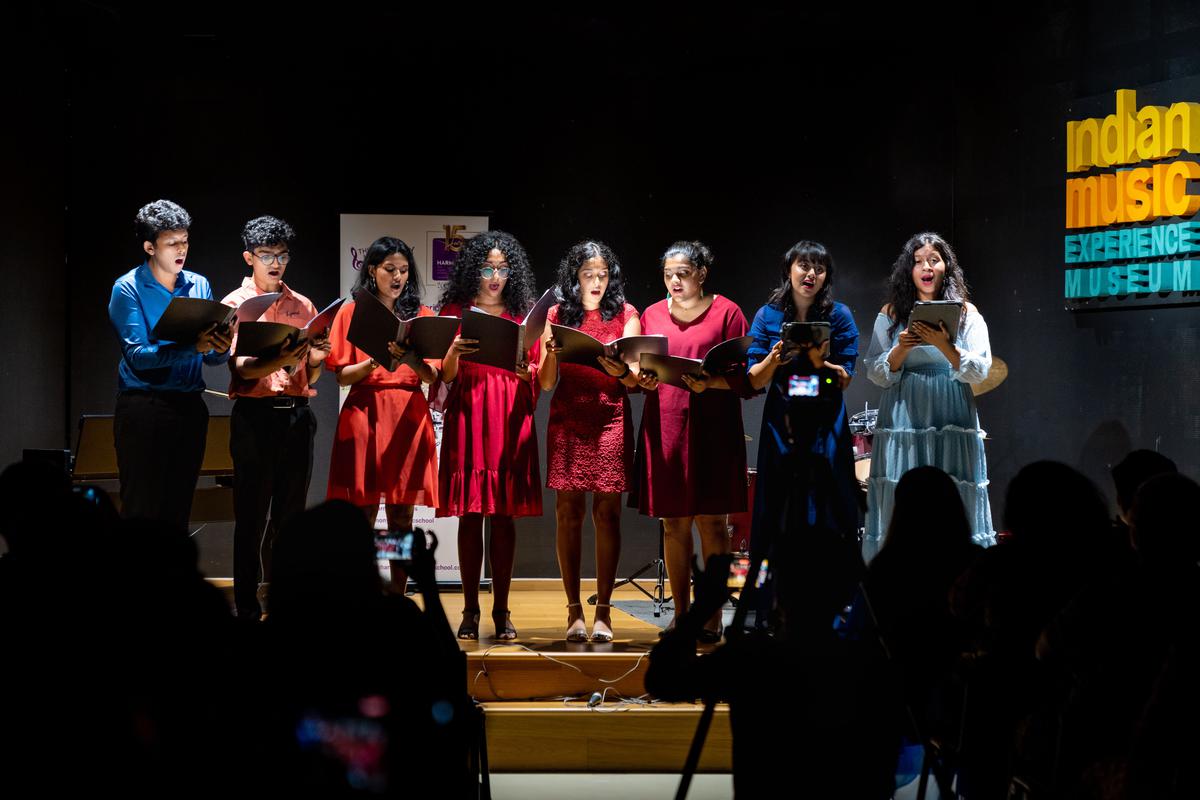How women composers made themselves heard in a prejudiced music world


Members of The Harmony Chorus performing at the Indian Music Experience in Bengaluru.
| Photo Credit: Special Arrangement
A renowned male composer was meeting with Queen Victoria in the Buckingham Palace. When the Queen particularly praised and even sang one of his compositions, he confessed, “… I found it very hard, but pride goeth before a fall – (I had to tell her) that Fanny had written that song, and would she now sing one of mine?”
Though his sister Fanny Mendelssohn was a musical mentor to him lifelong, Felix Mendelssohn had been chosen by his father to make music a profession, whereas, for his sister, their father decreed that music would be “an ornament.” Most of Fanny’s early works were published under her brother’s name.
A unique musical concert, ‘Celebrating women composers,’ directed by Sandra Oberoi and performed by ‘The Harmony Chorus,’ at Indian Music Experience, Bengaluru, explored just this theme. It brought to the fore songs and stories from the lives of women composers in western music. “The intention was to tease out forgotten voices and present them,” says Sandra.

Works by male composers have “stood the test of time, they’re celebrated and studied,” not because they are inherently superior but because of “a patriarchal perspective,” and because history has handed down lesser information to us about women’s compositions, she adds. As a music programmer, Sandra says, she has had to delve deep to put together a concert that will celebrate diverse voices and encourage more women musicians to find their voices as composers.
The works presented covered a range of timelines and genres. Songs from the late 1800s to contemporary times, they explored varied emotional landscapes and subjects. Pathos, humour, existential questions, love, friendship, deliverance from oppression and abuse, baking, bandits and more came up. There were operas, musical theatre pieces, pop songs — sung in ensemble or solo, unplugged or accompanied by instruments.
Anjali Pramod’s ‘Hard Times’ and Tiara Oberoi’s ‘Icarus’ — both compositions created by choir members during the pandemic, were premiered at the concert. They added richness to the musical offerings of the evening, with their fresh approach and lilting musicality. The interplay between stories and songs made the concert more interesting. They also piqued my curiosity about how some compositions made it over time despite concerted efforts to appropriate them, attribute them to men or simply not document them.
In response to her husband Gustav Mahler’s precondition that she give up composing after marriage, Alma Schindler Mahler is said to have written that “I have been taken firmly by the arm and led away from myself.” Sandra further describes how Gustav wrote Alma a “pretty song cycle” for their marriage, outlining her roles as his wife and supporter of his musical career. He even presented her a cook book. History mentions the possibility that Alma Mahler’s musical career was reignited by the request of her husband when he started receiving therapy from Sigmund Freud. It is said that Freud may have pointed him to the thought that his precondition to the marriage had also become the cause of marital discord. When Tiana Oberoi, accompanied on the piano by Khiyanur Vallikad, presented Alma’s composition, ‘Ich wandle unter Blumen’ in her soulful soprano voice, it was a just a beautiful song to be grateful for.
Tiana’s energetic rendition of ‘Les Brigands’ that described the bandits approaching, mirrored the vibrant personality of its Spanish composer, a “rockstar of her times,” Maria Felicità Malibran. “Her concerts caused traffic jams. Horse carriages would be stalled all around her concert venues,” we were told.
‘I know it’s today’ by Jeanine Tesori, performed by Rakish Krishnaprasad, Anjali Pramod, Lauren Carvalho (accompanied on the piano by Ryan Joseph) brought us sharply back to modernity as three Fionas (from Shrek) engaged in musical conversation in the voice of a practical yet dreamy woman.

Of the other songs from contemporary times, ‘Minefields’ by Morrocan-Canadian singer songwriter Faouzia and ‘She Used to be Mine’ by Sara Bareilles (from Waitress the Musical) stood out. Both were rendered by Tiara Oberoi with Ryan Joseph and Aditya Bansriyar providing support with voice, piano and percussion. The choir’s rendition of ‘You’ve got a friend’ by Carole King reflected their rapport with each other. A young, well-travelled choir whose members have almost grown up together while singing in many parts of the world and India, The Harmony Chorus’ concert on women composers not only showed great promise, it raised important questions on gender in music education and performance.

